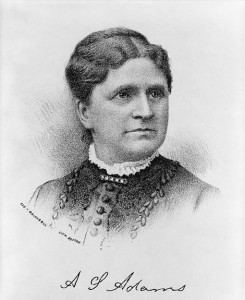Born into a Congregational minister’s home, Abigail Smith had much in common with most young women of her day. Though she would later be known as an advocate for the public educatio n of girls, she herself never received any formal education. Even so, her education was far from common. With the extensive libraries of both her father and grandfather, Abigail was well read in philosophy, theology, Shakespeare, the classics, ancient history, government, and law.
n of girls, she herself never received any formal education. Even so, her education was far from common. With the extensive libraries of both her father and grandfather, Abigail was well read in philosophy, theology, Shakespeare, the classics, ancient history, government, and law.
Abigail Smith became Abigail Adams not long after her 19th birthday, and together she and John Adams welcomed their first child into the world a few days short of nine months later. A mother before 20, Abigail managed the household finances and farm along with her husband while he also practiced law in Boston.
In 1774, John Adams went to Philadelphia as a delegate to the First Continental Congress. It was during their time apart that John and Abigail began a lifelong practice of writing each other. Their lengthy letters over the years of the formation of this nation serve as a detailed chronicle of Revolutionary life. One thing that marks their correspondence is their willingness to debate political issues with each other, often taking opposing sides, while still remaining united in their love for each other and commitment to the new nation.
One of the issues John and Abigail debated with each about privately was the legal status of women. She pressed her husband to consider equal legal status in the new form of government. Separated from her husband when he left for his diplomatic service as minister to France, and then to England in 1778, she kept him informed of domestic politics while he confided international affairs to her. She joined him in 1783, exploring France and England, received in the latter nation by the king.
When John was opposed by their close friend Thomas Jefferson in the presidential campaigns of 1796 and 1800, Abigail was deeply involved. When unable to attend her husband’s inauguration, she wrote of “a sense of the obligations, the important trusts, and numerous duties connected with it.”
 A highly partisan Federalist, Mrs. Adams helped forward the interests of the administration by writing editorial letters to family and acquaintances, encouraging the publication of the information and viewpoints presented in them. Her influence over her husband was often attacked in the press, and some anti-Federalists even labeled her, “Mrs. President.” Although fearful of French revolutionary influence on her young nation, Abigail was unsuccessful in urging the President to declare war on France. She also remained an adamant opponent of slavery until the day she died.
A highly partisan Federalist, Mrs. Adams helped forward the interests of the administration by writing editorial letters to family and acquaintances, encouraging the publication of the information and viewpoints presented in them. Her influence over her husband was often attacked in the press, and some anti-Federalists even labeled her, “Mrs. President.” Although fearful of French revolutionary influence on her young nation, Abigail was unsuccessful in urging the President to declare war on France. She also remained an adamant opponent of slavery until the day she died.
After her husband’s heart-breaking loss in his reelection bid against Thomas Jefferson, Abigail Adams remained deeply interested in national politics. Two old friends, Adams and Jefferson, remained alienated by differences in politics until tragedy entered Jefferson’s life. Upon hearing of the death of Jefferson’s youngest daughter, Abigail wrote to him, thus renewing a friendship that seemed all but hopelessly lost.
When once approached for permission to publish some of her political letters, Abigail Adams refused, considering it improper for a woman’s private correspondence to be publicly divulged. However, one of her grandsons arranged for the publication of some of her famous letters in 1848, becoming the first published book pertaining to a First Lady.
Abigail Adams was an amazing woman of deep faith, solid convictions, and determined action. Most of all she was a loyal wife, friend, and confidant to our second president. Like many women before and since, she may not have had a public vote, but she helped sway the heart and hand of one who did.
 Off The Grid News Better Ideas For Off The Grid Living
Off The Grid News Better Ideas For Off The Grid Living
